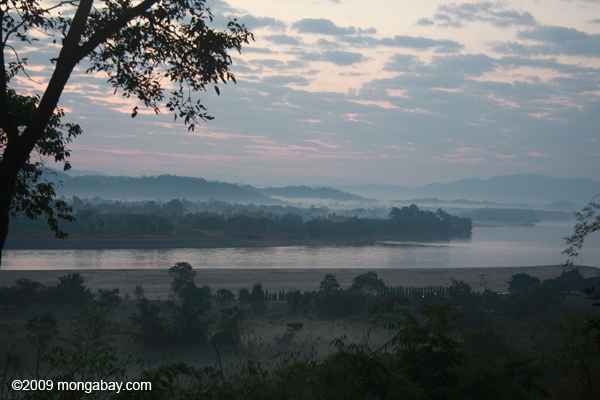
Mekong river at Chiang Saen in Thailand. Photo by: Rhett A. Butler.
As the governments of Laos, Thailand, Cambodia, and Vietnam ready to meet on April 19th to decide whether or not to move forward on the Xayaburi Dam, critics of Mekong River hydroelectric project have warned that the dam will devastate freshwater biodiversity and impact the livelihoods of hundreds of thousands, if not more. Last month a coalition of 263 organizations from 51 countries released a letter in opposition of the dam’s construction.
“As a river of global significance, we are urging the Governments of Laos and Thailand to call a stop to the destructive Xayaburi Dam,” said Pieter Jansen of Both ENDS, an international NGO and member of the coalition. “If the project proceeds, the [Mekong River Commission’s] regional decision-making process will lose all public credibility. ”
The $3.5 billion Xayaburi dam would be built in Laos, but largely bring power to Thailand. In total 2,100 people will have to be moved to make way for the dam, but according to critics the dam will impact nearly a quarter of a million people. Local fisheries are likely to be hard hit while environmentalists warn that the dam could lead to the extinction of dozens of species of fish, including the Critically Endangered Mekong giant catfish (Pangasianodon gigas). A rare giant, specimens have been caught weighing up to 600 pounds (270 kilograms). The river may also block essential nutrients for farming from making their way downstream.
 Researchers say the Xayaburi Dam on the Mekong would hit fishermen hard. Here, a man fishes at dawn on the Mekong River in Laos. Photo by: Rhett A. Butler. |
“The Xayaburi Dam will trigger an ecological crisis of tremendous proportions. We urge the Prime Ministers of Laos and Thailand to show leadership by cancelling this project,” said Shalmali Guttal of Focus on the Global South, another member of the 253 coalition against the dam.
For its part, the Laos government, which is pushing the project, has said the dam will be the “first environmentally friendly hydroelectric project on the Mekong” and would “not have any significant impact” on the river.
Researchers and environmentalists have asked for a ten-year delay to conduct better studies on the dam’s impact, a view that US Secretary of State Hillary Clinton shared when visiting the region. Cambodia, whose people stand to lose the most in fisheries, has also recommended a delay, while Vietnam has come out against the project, essentially splitting the four deciding nations.
Local protests have also proven lively with thousands of people who make their life along the Mekong showing up in opposition against the megadam.
“Our lives and livelihoods depend on the health of the Mekong River,” Kamol Konpin, mayor of the Thai riverside town of Chiang Khan, told the AP last week. “As local people have already suffered from dams built upstream in China and watched the ecosystem change, we are afraid that the Xayaburi dam will bring more suffering.”
In an age of worsening climate change, massive hydroelectric projects have become increasingly popular in many parts of the world—from the Belo Monte in Brazil to the Gibe III in Ethiopia—as a way to meeting rising energy needs. However large-scale dams come with their own sets of problems, including human displacement, decline in fisheries, loss of livelihoods, and ecological destruction.
Beyond that studies have also shown that dams are not as ‘climate friendly’ as proponents claim, especially not in the tropics. Dams on tropical rivers have been shown to release massive amounts of the methane, a greenhouse gas 25 times more potent than carbon dioxide in a 100-year timescale. In some cases tropical dams may release more greenhouse gases than fossil fuel powered plants.
Related articles
Cambodian prime minister cancels titanium mine project citing impact on biodiversity and local people
(04/11/2011) In a surprise move, the Cambodian Prime Minister, Sandech Hun Sen, has cancelled a titanium strip mine project in one of Southeast Asia’s last great intact forest ecosystems, the Cardamom Mountains. According to a press release sent out by the Cambodian government the mine was canceled due to “concerns of the impact on the environment, biodiversity and local livelihoods” of villagers. The mine, which was planned to sit directly in the migration route for the largest population of Asian elephants in Cambodia, had been largely opposed by locals in the region who spent years developing eco-tourism in the region.
New road project to run through Laos’ last tiger habitat
(03/15/2011) A new road project in Laos will run through the nation’s only protected area inhabited by breeding tigers, Nam Et Phou Louey National Park, reports the Vientiane Times. With only about two dozen tigers (Panthera tigris) left in the nation, conservationists fear that the road will harm the fragile population, which is known to be breeding. However, local officials say the road is necessary to improve access to remote villages and alleviate poverty in the region, which is among the worst in the province.
Cambodia approves rubber plantation—in national park
(03/13/2011) The Cambodian Prime Minister, Hun Sen, has approved a 9,000 hectare (22,200 acre) rubber plantation in Virachey National Park despite its status as a protected area, reports the Phnom Penh Post. The park is also listed as an ASEAN Heritage Park.